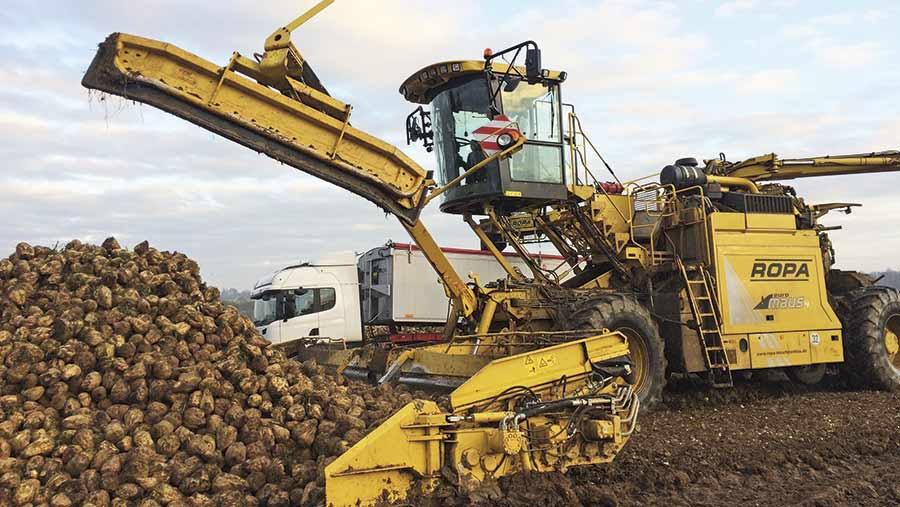Ropa Maus shifts a million tonnes of beet for Suffolk contractors
 © Nick Wigdahl
© Nick Wigdahl Even in a farm machinery world that is home to some wacky-looking kit, the self-propelled cleaner loader, or Maus, takes some beating. How do you justify investment of over £360,000 for a machine that just loads beet? The answer, it seems, is to load lots of it.
A Ropa EuroMaus 4 owned by Suffolk contractors Andy & Chris Clements has loaded more than a million tonnes of beet over the past five seasons.
In sugar terms, that equates to 155 million 1kg bags of Silver Spoon and is enough crop to single-handedly keep the Bury St Edmunds factory going for half a campaign.
See also: How to minimise sugar losses in beet clamps this harvest
The story started in 2012 when the Clements brothers partnered with Ken Rush of K&R Rush to invest in a new Maus 4 to work alongside their traditional trailed elevators.
For an asking price north of £350,000, their machine came with a 326hp Merc engine, a 10.2m intake and a loading elevator that stretches 15m.
The Maus lies dormant from March to September but in peak season works 14-hour days, drinking 1,100-litres of diesel each week and clocking up almost 1,500-hours annually.
It works within a 50-mile radius of its base at Lawshall near Bury St Edmunds, taking in Ongar to the south, Royston to the west, Attleborough in Norfolk and Felixstowe in the east.
Rapid loading
Speed of loading is the key to its success and it can brim a 29t wagon in just four minutes. In fact, its record is two minutes and 40 seconds, achieved when the Maus was positioned high on a bank with a clean heap of beet.

Driver Phil Sagon (left) and Chris Clements (right), owner of the Maus © Nick Wigdahl
In contrast, loading a straw-covered pile into a lorry perched high on a Fenland road can take twice that amount of time, but it’s the machine’s overall consistency that wins praise from owner Chris Clements.
“Ropa put a lot of thought into achieving better weight distribution and the Maus 4 was a big improvement over the Maus 3.”
“The chassis was lengthened and the outstretched fuel tank helps, though it is still weighted to the front and to the side, which can lead to a loss of traction in very sticky conditions.”
Maintenance
Mr Clements is strict about maintenance and strips the Maus down each summer. This process includes regularly replacing the 18 cleaning rollers on the front and four at the rear, which cost between £1,900 to £3,000 a piece.
Output tends to be restricted by the number of trucks available rather than the machine’s capacity – the one million tonnes represents 35,000 articulated lorries’ worth, which takes some coordinating.
“This season we ran 14 wagons, including eight of our own and six subcontracted, but even they can struggle to keep up on long runs,” he says.

